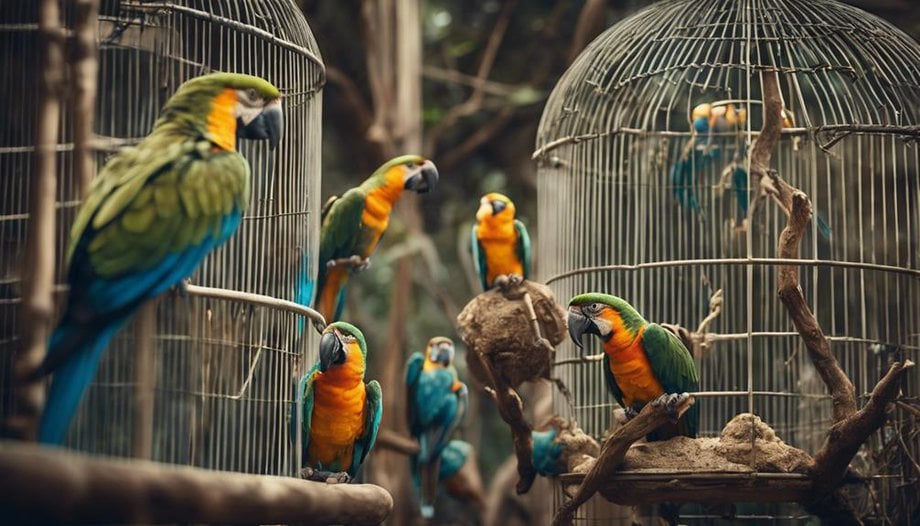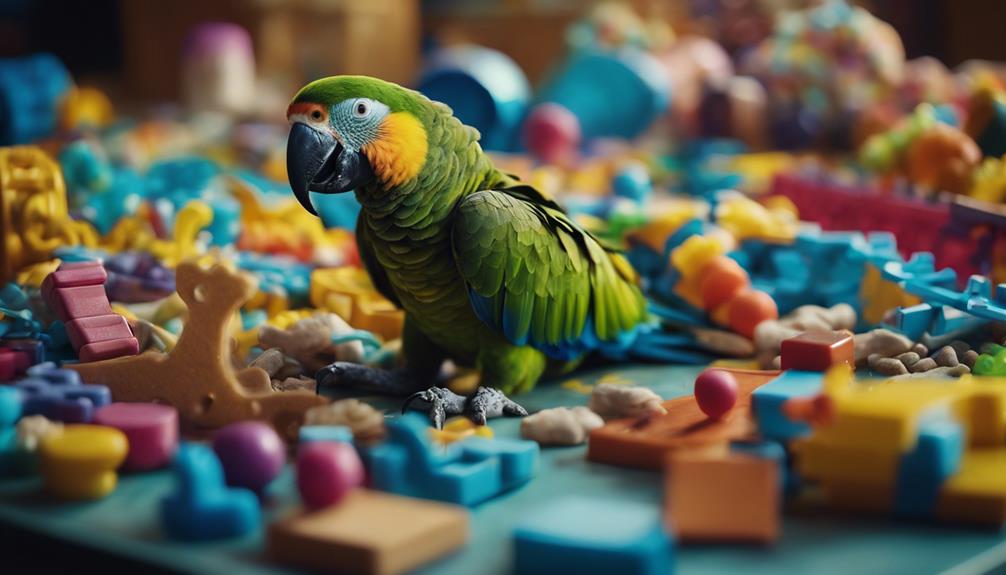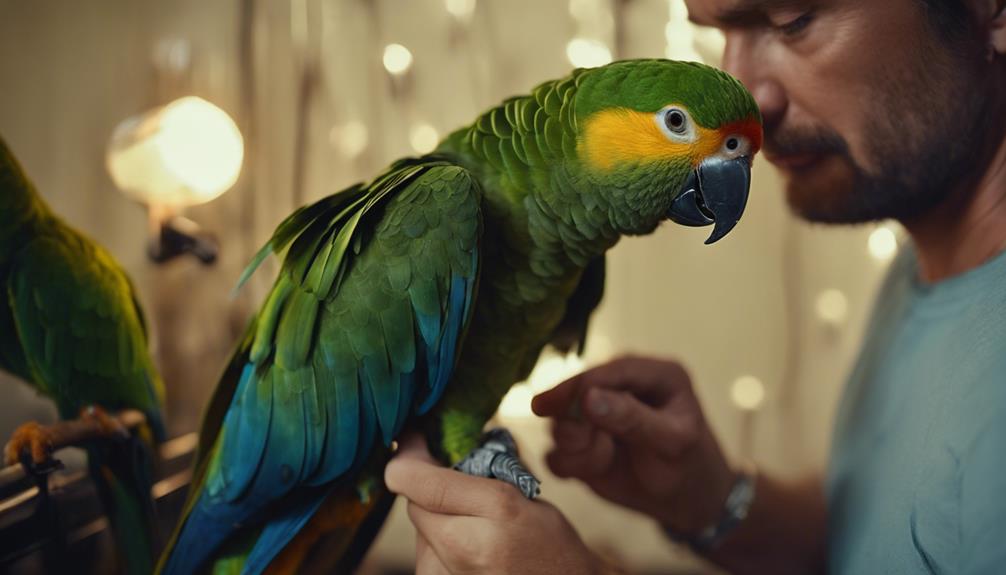What Are the Specific Needs of Blue-Fronted Amazons?

Blue-fronted Amazons are highly intelligent birds that require mental stimulation to prevent boredom and behavioral issues. Providing a variety of toys, puzzles, and interaction with their owners is essential for their well-being. Additionally, a balanced diet of fruits, vegetables, nuts, and pellets is necessary to maintain their health. Regular veterinary check-ups and proper grooming are also important to ensure their long-term happiness.
It is crucial to create a safe and spacious environment for Blue-fronted Amazons to exercise and explore. This includes a large cage with plenty of room for them to move around, as well as perches of varying sizes and textures to promote foot health. Avoiding exposure to toxic fumes, such as cigarette smoke and household cleaners, is vital for their respiratory health.
Proper socialization and training are key to developing a strong bond with Blue-fronted Amazons. Positive reinforcement techniques should be used to encourage desired behaviors and discourage negative ones. Spending quality time with these birds every day will help strengthen the human-bird relationship and ensure their emotional well-being.
In conclusion, meeting the specific needs of Blue-fronted Amazons requires a combination of mental stimulation, a balanced diet, a safe environment, proper socialization, and regular veterinary care. By providing these essentials, bird owners can help ensure the well-being and happiness of their feathered companions for years to come.
Diet Requirements
Blue-fronted Amazons require a varied diet rich in fruits, vegetables, nuts, and high-quality pellets to ensure optimal health and nutrition. Achieving nutritional balance is crucial for these intelligent birds, thus owners should provide a diverse range of foods to meet their dietary needs. It's recommended to establish a feeding schedule consisting of regular meals throughout the day to keep the birds energized and healthy.
Offering a wide food variety ensures that Blue-fronted Amazons receive essential nutrients such as vitamins, minerals, and proteins. Including dietary supplements can also help fill any nutritional gaps that may exist in their diet. Owners should be mindful of the specific nutritional requirements of these birds and tailor their meals accordingly.
Suitable Housing Options

To ensure the well-being and comfort of Blue-Fronted Amazons, providing suitable housing options is essential for their physical and mental health. When considering the space requirements for these birds, it's vital to provide a cage that allows for ample room to move around and stretch their wings. Blue-Fronted Amazons are active birds that benefit from cages that are at least 3 feet wide by 2 feet deep and 4 feet tall. The cage setup should include various perch options of different diameters to promote foot health and prevent muscle fatigue. Additionally, incorporating climbing accessories such as ropes or ladders can offer mental stimulation and physical exercise for these intelligent birds.
Ensuring that the cage is equipped with suitable perch options and climbing accessories can help prevent boredom and encourage natural behaviors in Blue-Fronted Amazons. Providing a well-thought-out living space is crucial for their overall well-being and happiness.
Socialization Needs

When considering the socialization needs of Blue-Fronted Amazons, it's important to understand their natural behaviors and social interactions within a flock setting. Blue-Fronted Amazons are highly social birds that thrive on interaction and companionship. Meeting their social needs is crucial for their overall well-being.
- Playtime Routines: Blue-Fronted Amazons benefit greatly from structured playtime routines. Providing them with interactive toys and engaging activities helps keep them mentally stimulated and socially active.
- Social Interactions: These birds enjoy socializing with their human caregivers. Allowing them regular time outside their cage to interact with family members helps strengthen their bond and prevents feelings of isolation.
- Bonding Exercises: Implementing bonding exercises such as training sessions or teaching them tricks not only provides mental stimulation but also enhances the bond between the bird and its owner.
Understanding the group dynamics of Blue-Fronted Amazons is essential to cater to their social needs effectively. By incorporating playtime routines, encouraging social interactions, and engaging in bonding exercises, caregivers can ensure these birds lead fulfilling and enriched lives.
Mental Stimulation Activities

Understanding the social nature of Blue-Fronted Amazons illuminates the importance of implementing various mental stimulation activities to cater to their cognitive needs effectively. Enrichment ideas are crucial for keeping these intelligent birds engaged and happy.
Providing a range of toys that encourage problem-solving, such as puzzle feeders or foraging toys, can help stimulate their minds and prevent boredom. Training techniques, like teaching them new tricks or commands, not only provide mental stimulation but also strengthen the bond between the bird and its caregiver.
Additionally, rotating toys regularly and introducing new ones periodically can prevent habituation and maintain interest levels. Interactive play sessions, where the Amazon can engage with its owner in a positive and stimulating way, are also beneficial for their mental well-being.
These activities not only keep the bird mentally sharp but also contribute to their overall happiness and quality of life.
Health Care Considerations

Blue-fronted Amazons require specific health care considerations to ensure their well-being.
This includes meeting their dietary requirements, providing behavioral enrichment, and scheduling regular veterinary check-ups.
Dietary Requirements
In order to maintain the optimal health of Blue-Fronted Amazons, it's crucial to carefully consider their specific dietary requirements. Blue-Fronted Amazons require a diet that ensures nutritional balance and food variety to meet their specific needs.
Providing a diverse range of fruits, vegetables, nuts, seeds, and high-quality pellets is essential for their overall well-being. Moreover, establishing a consistent meal schedule and practicing portion control are vital to prevent obesity and nutrient deficiencies in these intelligent birds.
Behavioral Enrichment
To ensure the overall health and well-being of Blue-Fronted Amazons, providing adequate behavioral enrichment is crucial as part of their health care considerations. Enrichment activities play a significant role in keeping these intelligent birds mentally stimulated and preventing boredom-related issues.
Creating a stimulating environment with toys, puzzles, foraging opportunities, and varying perches can help satisfy their natural behaviors and prevent stress. Additionally, engaging in behavioral training sessions can strengthen the bond between the bird and its caretaker while providing mental exercise.
Blue-Fronted Amazons are social creatures, so regular social interactions with their human companions or other compatible birds are essential for their emotional health. By incorporating these elements into their daily routine, caregivers can promote a fulfilling and enriching life for their Blue-Fronted Amazons.
Veterinary Check-Ups
Regular veterinary check-ups are essential for monitoring the health and well-being of Blue-Fronted Amazons and addressing any potential issues promptly. Blue-Fronted Amazons, like all pets, benefit from regular check-ups to ensure they're in optimal health. During these visits, the veterinarian can conduct a thorough examination, provide preventive care, and address any concerns that may arise. Regular check-ups are crucial for early detection of any health issues, allowing for timely intervention and treatment. This proactive approach to healthcare can help Blue-Fronted Amazons live longer, healthier lives.
- Comprehensive physical examination
- Vaccinations and parasite control
- Nutritional assessment and recommendations
Training and Behavioral Guidance

When training Blue-Fronted Amazons, consistency in reinforcement techniques is key to shaping desired behaviors effectively. Positive reinforcement methods, such as offering treats or verbal praise when the bird displays the desired behavior, can be highly effective. Communication techniques like using a consistent tone of voice and body language can also aid in training these intelligent birds.
In addition to training, bonding exercises play a crucial role in building a strong relationship with Blue-Fronted Amazons. Spending quality time with the bird, engaging in playtime routines, and providing mental stimulation through toys can help strengthen the bond between the bird and its owner.
It's essential to establish clear boundaries and rules during training sessions to prevent behavioral issues from arising. By setting expectations early on and consistently reinforcing positive behaviors, Blue-Fronted Amazons can learn to thrive in a structured environment. Patience, understanding, and a gentle approach are key when guiding these birds towards desirable behaviors.
Grooming and Hygiene Practices

How can owners ensure the optimal grooming and hygiene practices for Blue-Fronted Amazons are maintained regularly? Proper grooming and hygiene practices are essential for the health and well-being of these beautiful birds. Here are some key practices to keep in mind:
- Feather care: Blue-Fronted Amazons require regular preening to maintain the quality of their feathers. Owners should provide opportunities for their birds to engage in natural preening behaviors and ensure a clean environment to prevent feather issues.
- Bathing: Regular bathing helps Blue-Fronted Amazons keep their feathers clean and healthy. Owners can offer shallow dishes of water or mist their birds lightly to mimic natural rain showers, promoting good feather condition.
- Nail trimming, beak care: Regular nail trims are important to prevent overgrowth and potential injuries. Beak care is also essential; providing appropriate chew toys can help keep the beak in good shape while preventing boredom.
Frequently Asked Questions
How Can I Prevent My Blue-Fronted Amazon From Becoming Territorial or Aggressive?
To prevent a blue-fronted amazon from becoming territorial or aggressive, focus on behavioral training and socialization. Implement environmental enrichment and utilize positive reinforcement. By creating a stimulating and rewarding environment, the bird can learn to exhibit more positive behaviors.
Are There Any Specific Toys or Enrichment Activities That Are Recommended for Blue-Fronted Amazons?
Interactive toys and enrichment ideas are crucial for Blue-Fronted Amazons. Behavioral training and socialization techniques can be enhanced through activities like foraging puzzles, swing sets, and various chewable toys. These tools promote mental stimulation and physical exercise.
What Are Some Common Health Issues That Blue-Fronted Amazons Are Prone To, and How Can They Be Prevented?
Blue-fronted Amazons are prone to common illnesses like respiratory infections and obesity. Prevention includes regular vet check-ups, a balanced diet, and a clean living environment. Behavioral training can prevent aggression through positive reinforcement techniques and socialization.
How Can I Ensure My Blue-Fronted Amazon Gets Enough Exercise and Physical Activity?
To ensure their Blue-Fronted Amazon gets enough exercise and physical activity, one can provide outdoor playtime for flight training, offer climbing structures for mental stimulation. These activities are essential for the bird's well-being.
Are There Any Specific Dietary Supplements That Are Recommended for Blue-Fronted Amazons?
Blue-Fronted Amazons benefit from nutritional balance. Vitamin supplements can enhance their feeding habits and support digestive health. It's crucial to consult a vet for specific recommendations to ensure they meet their dietary needs.










